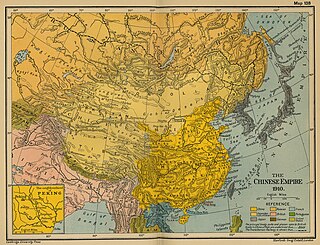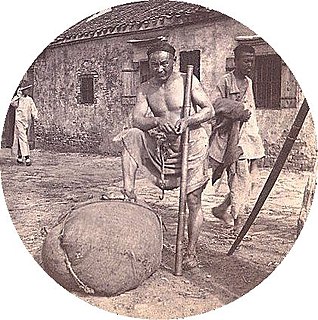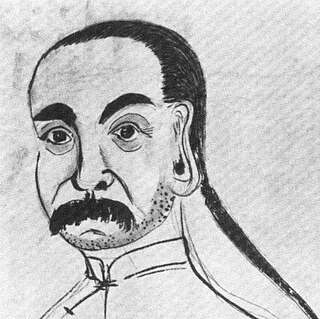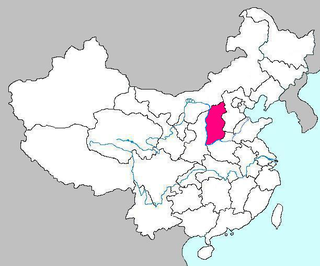 W
WThe Qing dynasty, officially the Great Qing, was the last imperial dynasty of China. It was established in 1636, and ruled China proper from 1644 to 1912. It was preceded by the Ming dynasty and succeeded by the Republic of China. The multiethnic Qing empire lasted for almost three centuries and formed the territorial base for modern China. It was the fourth largest empire in world history in terms of territorial size.
 W
WThe century of humiliation, also known as the hundred years of national humiliation, is the term used in China to describe the period of intervention and subjugation of the Chinese Empire and the Republic of China by Western powers, Russia and Japan in between 1839 and 1949.
 W
WConcessions in China were a group of concessions that existed during the late Imperial China and the Republic of China, which were governed and occupied by foreign powers, and are frequently associated with colonialism.
 W
WThe word coolie was first popularized in the 16th century by European traders across Asia, and by the 18th century would refer to migrant Indian or Chinese laborers, and by the 19th century, would gain a new definition of the systematic shipping and hiring of Asian workers under contract on plantations that had been formerly worked by enslaved Africans. The word has had a variety of other implications and is sometimes regarded as offensive or a pejorative, depending upon the historical and geographical context; in India, its country of origin, it is still considered a derogatory slur. It is similar, in many respects, to the Spanish term peón, although both terms are used in some countries with different implications.
 W
WThe Eight Trigrams uprising of 1813 broke out in China under the Qing dynasty. The rebellion was started by some elements of the millenarian Tianli Sect (天理教) or Heavenly Principle Sect, which was a branch of the White Lotus Sect. Led by Lin Qing and Li Wencheng, the revolt occurred in the Zhili, Shandong, and Henan provinces of China.
 W
WThe God Worshipping Society was a religious movement founded and led by Hong Xiuquan which drew on his own unique interpretation of Christianity and combined it with Chinese folk religion, faith in Shangdi, and other religious traditions. According to historical evidence, his first contact with Christian pamphlets occurred in 1836 when he directly received American Congregationalist missionary Edwin Stevens' personal copy of the Good Words to Admonish the Age . He only briefly looked over and did not carefully examine it. Subsequently, Hong had supposedly experienced mystical visions in the wake of his third failure of the imperial examinations in 1837 and after failing for a fourth time in 1843, he sat down to carefully examine the tracts with his distant cousin Feng Yunshan, believing that they were "the key to interpreting his visions" coming to the conclusion that he was "the son of God the Father and the younger brother of Jesus Christ who had been directed to rid the world of demon worship."
 W
WHonghuzi were armed Chinese robbers and bandits in the areas of the eastern Russia-China borderland, comprising southeastern Siberia, the Russian Far East, and Northeast China. The word has been variously transliterated as hong huzi, hong hu zi, hunghutze, hun-hutze, etc. There is also a common transliteration from Russian, khunkhuzy, and a back-formation for the singular, khunkhuz. It was also called ma-jeok(마적,馬賊) by Korean immigrants to Manchuria in the 20th century. Groups of honghuzi were recruited by the Imperial Japanese Army during the Russo-Japanese War into its chunchu sabotage units.
 W
WThe Nian Rebellion was an armed uprising that took place in northern China from 1851 to 1868, contemporaneously with Taiping Rebellion (1851–1864) in South China. The rebellion failed to topple the Qing dynasty, but caused immense economic devastation and loss of life that became major long-term factors in the collapse of the Qing regime in the early 20th century.
 W
WThe Oberlin Band was a group of Christian missionaries in China from Oberlin College in Ohio. Members of the Oberlin Band worked in Shanxi province from 1882 until 1900. During the Boxer Rebellion in 1900, the 15 missionary men, women, and children of the Oberlin Band were among the foreign missionaries executed by order of the provincial government or killed by Boxers and soldiers.
 W
WIn the early 19th century, Western colonial expansion occurred at the same time as an evangelical revival – the Second Great Awakening – throughout the English-speaking world, leading to more overseas missionary activity. The nineteenth century became known as the Great Century of modern religious missions.
 W
WThe Taiping Heavenly Kingdom, later shortened to Heavenly Kingdom or Heavenly Dynasty, was an unrecognized oppositional state in China and Christian-Shenic theocratic absolute monarchy from 1851 to 1864, supporting the overthrow of the Qing dynasty by Hong Xiuquan and his followers. The unsuccessful war it waged against the Qing is known as the Taiping Rebellion. Its capital was at Tianjing.
 W
WThe Taiping Rebellion, which is also known as the Taiping Civil War or the Taiping Revolution, was a massive rebellion or civil war that was waged in China from 1850 to 1864 between the established Qing dynasty and the theocratic Taiping Heavenly Kingdom. After becoming the bloodiest civil war in world history, the established Qing government won decisively, although it was weakened.
 W
WTaiwan under Qing rule refers to the rule of the Qing dynasty over Formosa from 1683 to 1895. The Qing court sent an army led by general Shi Lang and annexed Taiwan in 1683. It was governed as Taiwan Prefecture of Fokien Province (Fujian) until the declaration of Fokien-Taiwan Province in 1887. Qing rule over Taiwan ended when Taiwan was ceded to Japan by the Treaty of Shimonoseki in 1895. There were more than a hundred rebellions during the Qing period. The frequency of rebellions, riots, and civil strife in Qing Taiwan led to this period being referred to by historians as “Every three years an uprising, every five years a rebellion.”
 W
WThe third plague pandemic was a major bubonic plague pandemic that began in Yunnan, China, in 1855 during the fifth year of the Xianfeng Emperor of the Qing dynasty. This episode of bubonic plague spread to all inhabited continents, and ultimately led to more than 12 million deaths in India and China, with about 10 million killed in India alone. According to the World Health Organization, the pandemic was considered active until 1960, when worldwide casualties dropped to 200 per year. Plague deaths have continued at a lower level for every year since.
 W
WThe Yellow Sand Society, also known as Yellow Way Society, and Yellow Gate Society, was a rural secret society and folk religious sect in northern China during the 19th and 20th century.
 W
WThe Boxers, also known by various other names in both Chinese and English, was a Chinese secret society known for having triggered the Boxer Rebellion from 1899 to 1901. It became a massive movement, counting anywhere between 50,000 and 100,000 members. Though the group originally supported the downfall of the Qing leadership of China for being "westernized", the group would later support the ruling Empress Dowager to try and eliminate groups the Boxers opposed, including Christians, Europeans, Caucasians, Japanese, "Western" Chinese, and others who were determined to be detrimental to their efforts, at certain points including other secret societies. The group was all but destroyed by the end of the Boxer Rebellion, with most of its leadership and structure eliminated, though some of its former members continued their actions in various other groups across China.
 W
WYong Ying were a type of regional army that emerged in the 19th century in the Qing dynasty army, which fought in most of China's wars after the Opium War and numerous rebellions exposed the ineffectiveness of the Manchu Eight Banners and Green Standard Army. The Yong ying were created from the earlier tuanlian militias.